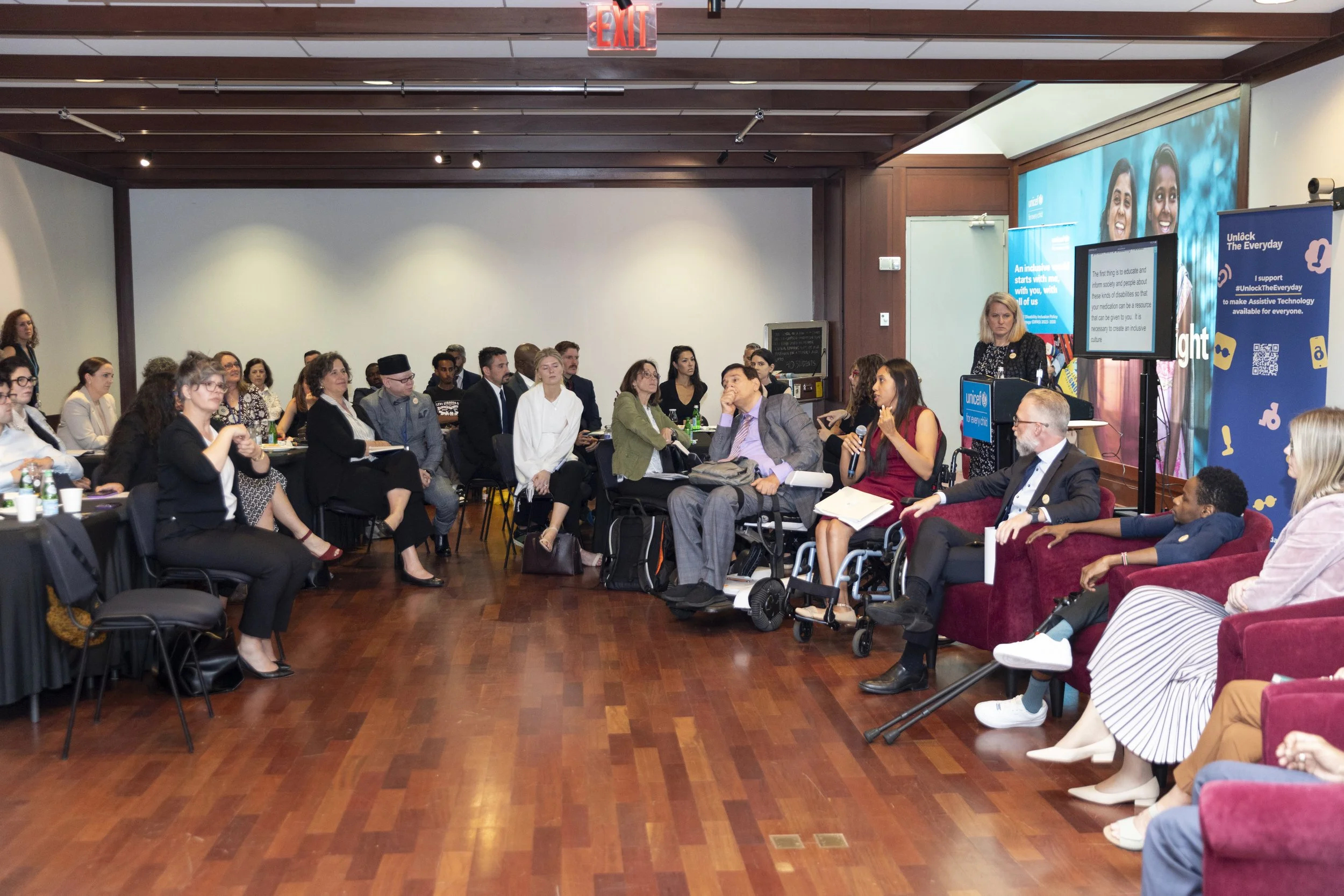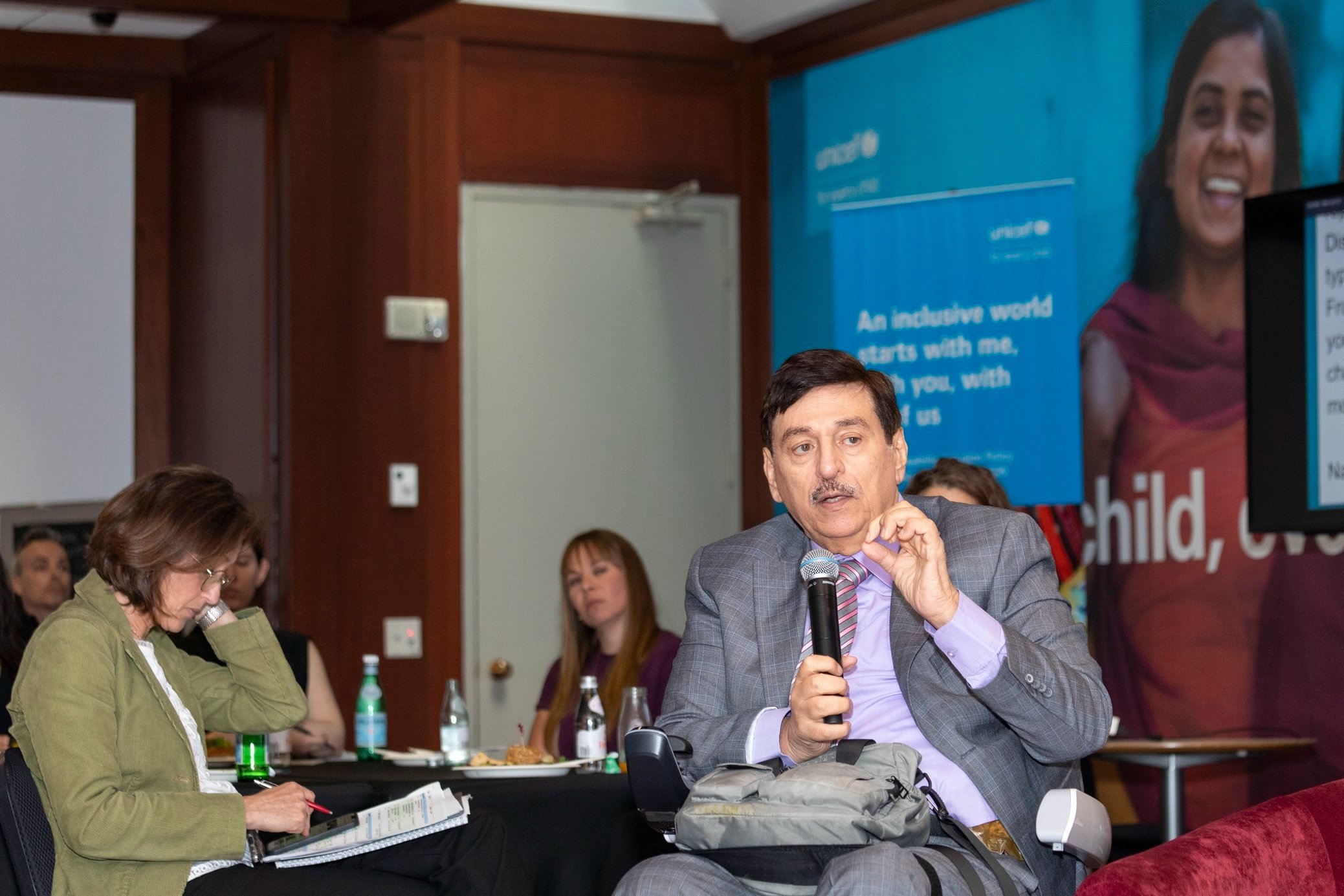The United Nations Conference of States Parties to the Convention on the Rights of Persons with Disabilities (COSP17) was convened at the United Nations Headquarters in New York, from 11 to 13 June, 2024, with an overarching theme, Rethinking disability inclusion in the current international juncture and ahead of the Summit of the Future. The conference brings together governments and stakeholders to review progress in implementing the Convention and its Optional Protocol.
On the sidelines of the conference, supported by the governments of Australia, and the United States, ATscale, UNICEF, the International Disability Alliance (IDA), the Global Disability Innovation Hub (GDI) and WHO, hosted a side event on "The power of partnership to achieve access to assistive technology”, on 12 June held at UNICEF House.
The well-attended side event brought together representatives from member states, UN agencies, civil society organizations, organizations of persons with disabilities, advocates and the private sector to discuss solutions to close the gap in access. During the event, participants emphasized the transformative power of assistive technology in unlocking opportunities for persons with disabilities worldwide. The lively discussion centered on the crucial role of partnerships and innovation to address the barriers to access.
The following photo summary provides highlights from the event:
Photo Credit: ATscale/Tadej Znidarcic
Sarah Goulding, Assistant Secretary and Principal Specialist Gender Equality, Australian Department of Foreign Affairs and Trade (DFAT) – Keynote Speaker
“We are the newest donor to ATscale, which is why we've had the opportunity to join you and given this prestigious slot at this important event.
If there is a space where we need to be transformative and shift access to assistive technology, it's in education in the Pacific. We're listening and responding to these calls. I'm pleased to share with all of you today that in the most recent May 2024 budget, the Commonwealth of Australia announced we would increase the disability fund we have that my team administers for $14 million that would add 8 million to strengthen investment in assistive technology in the Pacific and Asia
I would like to commend all of you in this room that are part of the ATscale family. What makes ATscale such an exciting opportunity for us to be part of is the level of collaboration it's brought and the level of innovation to the approach in investing in technology, systems, voice and leadership, and investing in access.”
The panelists: L-R: Nawaf Kabbara, Maria Jose Carranza, Pascal Bijleveld, Bernard Chiira, Jenny Lay Flurrie, Kylie Shae, Gopal Mitra.
The panel highlighted the urgent need for a multisectoral approach involving governments, UN agencies, NGOs, and the private sector to ensure widespread access to assistive technology.
Despite its potential to promote independence and participation, a staggering 90% of those in low and middle-income countries lack access to AT.
Pascal Bijleveld, ATscale CEO - Moderator
“I think many of you are aware of some key bottlenecks we're facing such as lack of awareness, financing, and human resources. The list goes on and on, sadly.
Dealing with all of these bottlenecks and addressing this big challenge cannot be done alone. It requires everyone coming together. This is what laid at the basis and genesis of ATscale”.
Gopal Mitra, Global Lead on Disability and Development, UNICEF
“For UNICEF, we also feel that we are well placed because provisioning of assistive technology requires a multi-sectoral effort. Our work with partners like WHO on health, our work in countries on education and social protection makes us quite well placed to make a difference in this area.
For a child with a disability, access to assistive technology is often the difference between inclusion and total exclusion. More than that, it's a matter of dignity”.
Nawaf Kabbara, President, International Disability Alliance
“Assistive technology is one of the key components of neutralizing disability. Research on assistive technology is what makes things become much better in a way that we can live our life with the least possible sense of disability”.
Bernard Chiira, Director Innovate Now, Global Disability Innovation Hub, Kenya
“The idea that the issue of assistive technology is not just a medical issue. It's not just a human rights issue. It's also an economic issue. It's also a great area of opportunity. I've seen a great shift in the innovation for assistive technology.
When you look at most assistive technology today, it's developed furthest from where the need is. The great inequalities we have in terms of access to assistive technology are also a reflection of the great inequalities we have in the assistive technology industry.”
Jenny Lay Flurrie, Chief Accessibility Officer, Microsoft
“I'm here as a product of health care, as a product of assistive technology. I was given the right healthcare as a kid. My parents are both teachers. They got me to the right doctors. They provided, through the National Health Service, hearing aids and the right surgery, glasses, support, and frameworks. We should never take that for granted.
Digital technologies, as they evolve, could have an implication for the world, particularly in low- and middle-income countries, if people are aware of them, if they're affordable.
It's very important that technology companies are at this table. We have a responsibility and an obligation to provide accessible technologies that are affordable and available and embedded as part of the devices”.
Maria Jose Carranza, Advocate for the rights of persons with disabilities, and UNICEF youth ambassador, Guatemala
“Assistive technology encompasses systems and tools to help individuals by promoting independence, improving quality of life, and facilitating participation in various aspects of daily living like education, employment, and social interactions.
It is important to recognize that assistive technology is a game changer for us. Our tools that improve our quality of life through making things easier for us”.
Kylie Shae, Team Lead on access to assistive technology, World Health Organization (WHO)
“While there is a significant and appropriate focus on strengthening primary healthcare systems to address many interventions, doing screening and provision of simple products such as glasses, we need to also strengthen secondary and tertiary level services to provide things like wheelchair solutions, assistive products for low vision or blindness, etc.
From a health systems perspective, we have to work in partnership within the health system, building the skills, capacity, and referral pathways. We need to work in partnership with other sectors coordinating with education, labour, trade, etc. And we need to listen to the representative voices of assistive technology users, including persons with disabilities and coordinate our activities to ensure an effective response to their needs”.
Iain McKinnon, CEO and co-founder Global Disability Innovation Hub - Closing remarks and summary:
“Thinking about assistive technology, it doesn't just unlock the everyday. Listening to this panel and hearing from these powerful leaders, assistive technology also allows them to change the world in their jobs and roles leading change.
Partnerships are key. For me, diverse partnerships are vital. We must each play our own part and play to our own strengths and complement each other to be more than the sum of our individual parts.
We were talking about innovation and assistive technology. I think about designers from all design disciplines and sectors. Entrepreneurs. Architects. Urban planners. Teachers. Scientists.
Today, we've heard the power of storytelling. I think about journalists and photographers and filmmakers and writers. Making sure they're aware of everything we're talking about today and the importance of disability inclusion.
And we've talked about empowering stakeholders to take action. For me, that's really the power of research, robust, high-quality research that generates data that we can use. Information is power. That can help us create tools, mechanisms, and frameworks that people can use to have real implementation on the ground.
We are the movement in this room and beyond that can transform markets, industries, societies, and have a positive impact on the billions of people that stand to benefit from assistive technology. Genuine collaboration is vital. For those of us already doing this here in this room, I say keep pushing, keep going”.
The event was attended by over 120 people and the panel discussion was followed by a lively Q and A session.
Some Key Takeaways
The discussion revolved around the importance of making assistive technology more affordable and accessible, particularly in low-income countries where support systems are lacking.
There was emphasis on the necessity of after-care support for assistive products like hearing aids to ensure their effectiveness and longevity.
The importance of informed decisions by well-trained professionals and the need for a strong healthcare system to support such interventions was stressed.
Sign language was underscored as crucial for the development and growth of individuals, especially children, in conjunction with the propagation of assistive technology.
The power of storytelling, research, and collaboration in promoting disability inclusion and driving real implementation on the ground was acknowledged.
Stakeholders were encouraged to join the movement towards transforming markets, industries, and societies through assistive technology, with a call for continued perseverance and genuine collaboration.
Assistive technology is crucial for emergency responses so that we can provide essential products in humanitarian contexts. WHO, UNICEF and ATscale are all working on this, for example, through WHO’s AT10 and AT6 kits of the assistive products that people displaced due to emergency need the most; and the WHO online training module on assistive products in emergencies. These efforts underscore the importance of ensuring access to assistive technology and rehabilitation services in humanitarian settings.
















